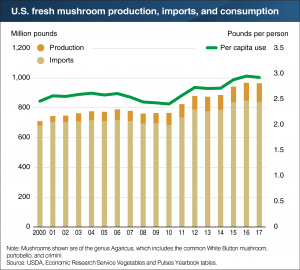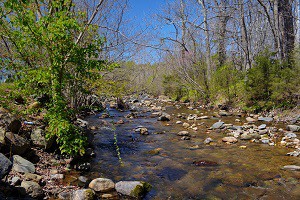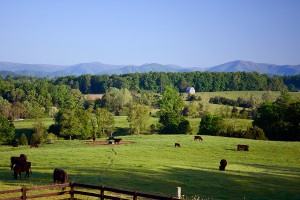The Mushroom Market
When you think of farming, do you picture crops such as corn and soybeans, or think of garden vegetables and fruit orchards? Have you ever considered that fungi can also be farmed?

Source: USDA
This fall, the USDA released a study that estimated Americans consume nearly 3 pounds of fresh mushrooms annually. The study also found that 88 percent of mushrooms farmed in the U.S. “are sold in the fresh market.” Further, the USDA report found, “per capita consumption of Agaricus mushrooms increased by nearly 22% since 2010.” (Agaricus mushrooms are a genus that includes White Button, Portobello, and Cremini mushrooms.)
Sharondale Farm, just a few miles east of Charlottesville in Keswick, exclusively grows Organic Certified mushrooms and teaches customers how to grow their own, too. Owner Mark Jones founded Sharondale Farm in 2004. With a M.S. in Plant Health and a background in horticultural therapy for youth and disabled adults, his interest in farming mushrooms extends beyond consumption. The farm’s website details his current work as “low-input mushroom growing for small farm diversification; fungi that contribute to agroforestry and natural resource management plans; intercropping mushrooms in the food forest for production of food, medicine, and soil fertility; and collecting local strains of mushrooms that have potential as food, medicine, and earth healers.” Who knew mushrooms were so versatile?
North Cove Mushrooms in Madison County offers their greenhouse-grown mushrooms all year long, as well as their homemade prepared foods, such as mushroom ravioli and shiitake bean burgers. Their booth can be found at the Charlottesville City Market in season (April-December). They also run a food truck called North Cove Café, which can be found at various locations in Madison and has a menu that includes items such as a mushroom crepe and mushroom tempura. (Yum!)
Next time you think about farming, don’t forget your local fungi farmers!

